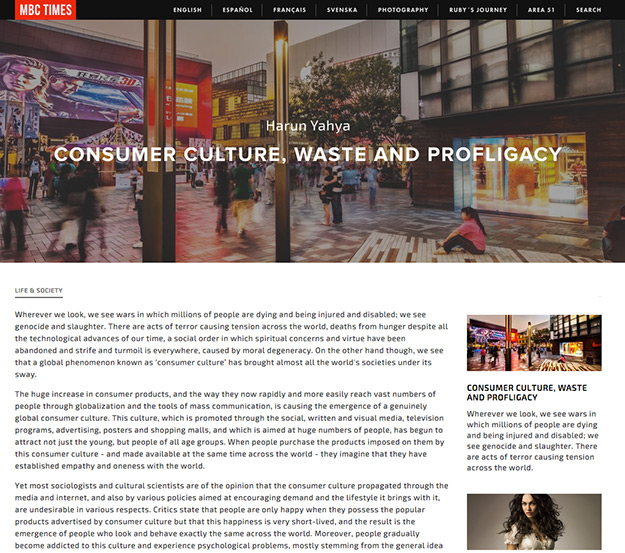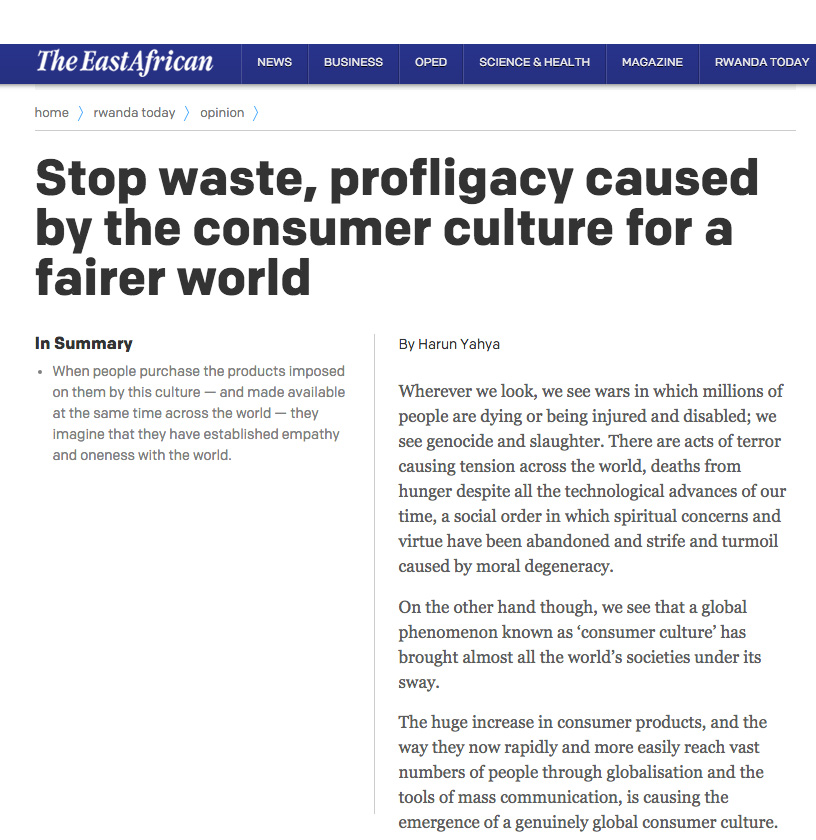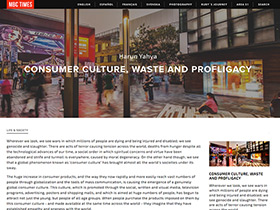
Wherever we look, we see wars in which millions of people are dying and being injured and disabled; we see genocide and slaughter. There are acts of terror causing tension across the world, deaths from hunger despite all the technological advances of our time, a social order in which spiritual concerns and virtue have been abandoned and strife and turmoil is everywhere, caused by moral degeneracy. On the other hand though, we see that a global phenomenon known as ‘consumer culture’ has brought almost all the world's societies under its sway.
The huge increase in consumer products, and the way they now rapidly and more easily reach vast numbers of people through globalization and the tools of mass communication, is causing the emergence of a genuinely global consumer culture. This culture, which is promoted through the social, written and visual media, television programs, advertising, posters and shopping malls, and which is aimed at huge numbers of people, has begun to attract not just the young, but people of all age groups. When people purchase the products imposed on them by this consumer culture - and made available at the same time across the world - they imagine that they have established empathy and oneness with the world.
Yet most sociologists and cultural scientists are of the opinion that the consumer culture propagated through the media and internet, and also by various policies aimed at encouraging demand and the lifestyle it brings with it, are undesirable in various respects. Critics state that people are only happy when they possess the popular products advertised by consumer culture but that this happiness is very short-lived, and the result is the emergence of people who look and behave exactly the same across the world. Moreover, people gradually become addicted to this culture and experience psychological problems, mostly stemming from the general idea ‘He's got Product X, so why don’t I?’ The encouragement of demand, particularly for tech products such as cell phones and tablets and increasing sales through advertising is regarded (and criticized) as one of the primary ways in which this culture is nourished.
Among the justified criticisms is the fact that becoming addicted to, and a captive of, a particular culture prevents people from growing in spiritual terms, resulting in underdeveloped individuals and societies. Although it is perfectly legitimate to wish to buy products made available by consumer culture and to follow and adopt a fashion disseminated across the world, the fact that people become deeply unhappy when they find themselves unable to buy these products, and suffer serious psychological distress as a result, is without doubt a sign of severe personality disorders. In addition, to imagine that true happiness, which is only actually possible through a highly developed spirituality and a clear conscience, can be attained through the purchase and possession of material things is a sign of a false and coarse way of thinking.
It is also however true that the consumer culture criticized for the reasons cited above also leads to technological advances that raise overall living standards and make life more comfortable, and that this leads to rapid change and progress across the world. We need to admit that the world is changing, and mindsets are changing, too; people today delight in enjoying the modern world, technology, fashion, sport, art and films or entertainment created by the consumer society. They want to do what they wish, without hindrance, in the manner they choose, and to live without oppression in freedom and liberty. They do not want harsh discipline. A more libertarian, respectful and sensitive way of thinking about individual rights and freedoms dominates the world today. Furthermore, the vast distances of the planet are being virtually eliminated through the internet, television, smartphones and other tools of mass communication. Information and ideas can be disseminated to large numbers of people in a matter of seconds through communications technologies. Thanks to more efficient transportation, one can reach one place in the world from another very quickly; you can be across the globe in a day or so. Thanks to advanced communication tools, it is easy to make contact with people and organizations tens of thousands of kilometers away. People can come together with others who share the same feelings and hobbies. These are all doubtlessly positive developments resulting from our emerging common world culture.
On the other hand, however, there is another very significant risk growing together with the consumer culture, and that is extravagancy. While the idea of consumption has grown as never before, global waste and extravagance have increased in a parallel manner. According to figures from the Organization for Economic Cooperation and Development and the U.N. Food and Agriculture Organization (FAO), one out of every three food items produced for consumption in the world is thrown away. The global level of food wasted stands at 1.3 billion tons a year: Yet every year, 18 million people around the world die from hunger and malnutrition, while a staggering five hundred million people are undernourished. Every year, some two million children die from starvation, malnutrition and related causes. Enough food is thrown away by the developed countries to feed 15 times the number of people who starve to death every year. Although it has long been noted that waste can be prevented with good planning and the problem of hunger can be overcome through a more balanced distribution of the world’s wealth in the world, hunger still tops the list of ‘the world’s 10 greatest health risks.’
France’s recent enactment of a law, one that represents a model to the world in the fight against waste and hunger, was an excellent development . Under this law, presented before the Parliament by former French Minister of Food Guillaume Garot and subsequently signed into force, all supermarkets in the country now have to donate food that is about to pass its sell-by date. Under the law, which is expected to provide a complete solution to the problem of food waste in the country by 2025, excess food will either be sent to charities or given to animals.
It is obvious that if such measures and regulations are put into practice throughout the world as a whole, a major success in the prevention of waste will be attained. However, there is only one way to completely eradicate waste and profligacy from the world, and that is for people to become more sensitive to the tragedies going on all around them. It should never be regarded as normal for children in the middle of a war zone to wander round in ragged clothes and barefoot, scavenging food from trash bins; for millions of people to die from hunger and malnutrition, or for millions more people to struggle to survive under the threat of bombs. That is what must become the primary issue for all of us. Only then can love, peace and security prevail everywhere and the world can become a better place to live in.
Adnan Oktar's piece in MBC Times & The East African:
http://www.mbctimes.com/english/consumer-culture-waste-and-profligacy
http://www.theeastafrican.co.ke/Rwanda/Opinion/1433246-2876530-item-1-11v7ix6z/index.html



